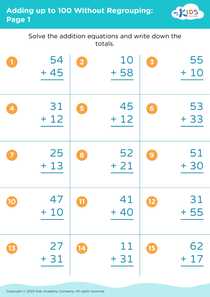Fine Motor Skills Adding up to 100 with Regrouping Worksheets for Ages 3-7
3 filtered results
-
From - To
Enhance your child's fine motor skills while mastering addition with our engaging "Adding up to 100 with Regrouping" worksheets, designed specifically for ages 3-7. These printable exercises provide a fun way to combine math learning with important hand-eye coordination activities. Each worksheet focuses on developing grip and control through tracing, coloring, and connecting dots, ensuring children strengthen their fine motor abilities alongside their numerical understanding. As they practice regrouping and addition techniques, they'll gain confidence in mathematics while boosting their dexterity. Perfect for home or classroom use, these worksheets make learning both effective and enjoyable!
Fine motor skills and mathematical concepts, particularly adding up to 100 with regrouping, are crucial for children aged 3-7 as they form the foundation for future academic success. Developing fine motor skills involves strengthening the small muscles in children's hands and fingers, enabling them to perform tasks like writing, cutting, and manipulating objects with precision. These skills are essential for both academic and everyday activities, allowing children to express themselves, complete school assignments, and engage in play.
Conversely, mastering the concept of addition and regrouping helps children develop critical thinking and problem-solving abilities. Understanding how to break numbers down and regroup them fosters numerical fluency, which is vital for tackling more complex mathematical concepts later. When children can seamlessly combine strong fine motor skills with foundational math knowledge, they build confidence, independence, and a love for learning.
For parents and teachers, nurturing these skills means providing children with engaging activities, such as crafting, tracing, or using manipulatives, to bridge the gap between fine motor development and mathematics. By emphasizing both areas, adults can equip children not only with essential academic abilities but also with practical skills that enrich daily life and prepare them for a bright future.


















